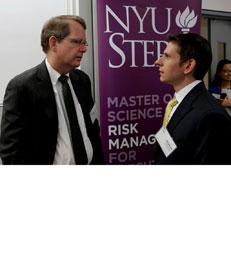Business and Policy Leader Events
Risk & the Global Economy Are Focus at NYU Stern’s 2nd Annual Risk Management Symposium
—


Both ability and willingness of governments to pay their debt in full and on time is critical. - John Chambers
On Saturday, May 31, approximately 100 risk professionals and Stern alumni gathered in New York to hear from John Chambers, deputy head of Standard & Poor’s Sovereign Ratings Group, and NYU Stern Professors Michael Posner, Viral Acharya and Bruce Tuckman at NYU Stern’s Second Annual Risk Management Symposium. The Symposium centered on thought-provoking subjects related to risk and the global economy.
Chambers opened the Symposium with a discussion on sovereign risk with Stern Professor and MS in Risk Management Program (MSRM) Academic Director Ingo Walter. Chambers discussed sovereign government ratings methodology and emphasized that, “Both ability and willingness of governments to pay their debt in full and on time is critical.”
Professor Posner, co-director of the NYU Stern Center for Business and Human Rights, followed with a presentation of his research on human rights issues in emerging markets. He discussed risks in the global supply chain created by the indirect procurement model used to source from poor countries with weak institutions and inadequate infrastructure. He stressed, “All actors across the supply chain need to acknowledge the risks, as business as usual is not an option anymore.”
Professor Acharya discussed emerging systemic risks in China and India and shared the global systemic risk rankings from the Stern Volatility Institute’s Volatility Lab (V-Lab). The V-lab uses market data to provide real-time measurement, modeling and forecasting of financial volatility. Professor Acharya stated that, “Rising systemic risk in China and India is a growing concern in light of China’s credit bubble, shadow banking and slowing GDP growth, and poor asset quality and high leverage of India’s public sector banks.”
Professor Tuckman concluded the Symposium with a discussion on financing risk in the derivatives market. He compared financing risk in swaps, bonds, forwards/futures, CDS and call options. He noted, “Current regulatory debate ignores the embedded financing in derivatives, and overly discouraging derivatives may increase systemic risk.”
The Annual Risk Management Symposium is sponsored by NYU Stern’s Master of Science in Risk Management (MSRM) Program. The event is part of a two-day MSRM alumni engagement initiative aimed to continue alumni involvement and discuss current risk issues with faculty and practitioners.
Chambers opened the Symposium with a discussion on sovereign risk with Stern Professor and MS in Risk Management Program (MSRM) Academic Director Ingo Walter. Chambers discussed sovereign government ratings methodology and emphasized that, “Both ability and willingness of governments to pay their debt in full and on time is critical.”
Professor Posner, co-director of the NYU Stern Center for Business and Human Rights, followed with a presentation of his research on human rights issues in emerging markets. He discussed risks in the global supply chain created by the indirect procurement model used to source from poor countries with weak institutions and inadequate infrastructure. He stressed, “All actors across the supply chain need to acknowledge the risks, as business as usual is not an option anymore.”
Professor Acharya discussed emerging systemic risks in China and India and shared the global systemic risk rankings from the Stern Volatility Institute’s Volatility Lab (V-Lab). The V-lab uses market data to provide real-time measurement, modeling and forecasting of financial volatility. Professor Acharya stated that, “Rising systemic risk in China and India is a growing concern in light of China’s credit bubble, shadow banking and slowing GDP growth, and poor asset quality and high leverage of India’s public sector banks.”
Professor Tuckman concluded the Symposium with a discussion on financing risk in the derivatives market. He compared financing risk in swaps, bonds, forwards/futures, CDS and call options. He noted, “Current regulatory debate ignores the embedded financing in derivatives, and overly discouraging derivatives may increase systemic risk.”
The Annual Risk Management Symposium is sponsored by NYU Stern’s Master of Science in Risk Management (MSRM) Program. The event is part of a two-day MSRM alumni engagement initiative aimed to continue alumni involvement and discuss current risk issues with faculty and practitioners.
